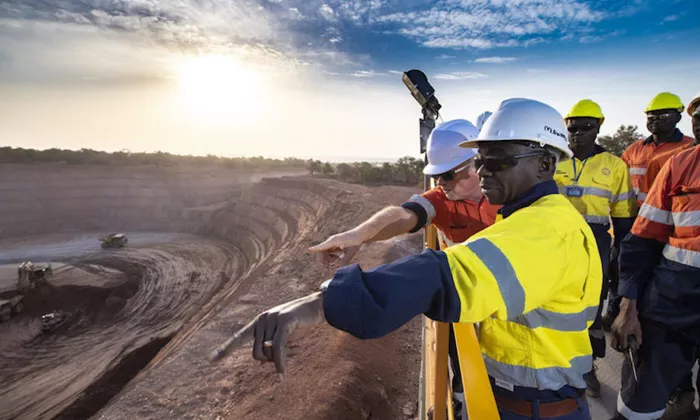A Chinese mining company operating a gold mine in eastern Zimbabwe has come under heavy scrutiny from government officials and local residents. Sino Africa Huijin Holdings, which has been active in the Premier Estate area of Mutasa District, Manicaland, since at least 2021, is facing accusations of environmental damage and health risks to nearby communities.
Residents have voiced concerns about the impact of the company’s mining activities, including blasting operations that have led to widespread ecological destruction. Locals claim that the blasts have not only caused the decimation of a mountain and the displacement of wildlife but have also triggered tremors that have damaged homes. Complaints also include air pollution from dust and fears that water sources could be contaminated by cyanide, a substance used in the gold extraction process.
Adding to the controversy, Sino Africa Huijin is accused of forging community signatures on its Environmental Impact Assessment (EIA) document, raising questions about the transparency and legitimacy of its operations.
Government Action and Community Protests
The growing dissatisfaction prompted the Zimbabwean government to intervene, with the Manicaland Joint Command Task Force enforcing temporary shutdowns of the mine twice in 2024. The first suspension, in October, lasted for two weeks, while the second took place in mid-November. Both closures were enforced to ensure the company met environmental and regulatory requirements.
Traditional Chief James Kurauone of Mutasa District criticized the company for failing to address the concerns raised by local communities, including severe air pollution, harmful blasting, and unmet corporate social responsibility commitments. In response to these ongoing issues, Chief Kurauone has announced plans to organize a meeting with mining officials and community members to discuss possible solutions.
Mining Resumes Amidst Ongoing Scrutiny
Despite these setbacks, mining operations resumed on November 25 following discussions between government representatives, community leaders, and Sino Africa Huijin. The company’s HR manager, Daniel Panganai, confirmed the company’s compliance with regulatory requirements but declined to provide further details.
Misheck Mugadza, the Manicaland Minister of State, also assured the public that the company was adhering to environmental standards. He pointed out that Sino Africa Huijin had made efforts to fulfill its social obligations by donating to a local hospital and drilling a well to provide water to the nearby school. Furthermore, the government is closely monitoring the company’s activities, with some households already receiving full compensation for the damages caused by the mining operations.
Broader Concerns Over Chinese Investments
The Sino Africa Huijin controversy is part of a larger pattern of criticism surrounding Chinese-owned mines in Zimbabwe. A report from the Center for Natural Resource Governance (CNRG), a Harare-based community rights group, highlighted the environmental and social issues associated with Chinese investments in the country’s mining sector. According to the report, Chinese ventures control approximately 90% of Zimbabwe’s mining industry and have been linked to widespread environmental degradation, violations of labor laws, and the disregard for local communities’ cultural rights.
In 2023 alone, Sino-related investments contributed $2.79 billion to Zimbabwe’s mining sector, according to CNRG Executive Director Farai Maguwu.
Allegations of Corruption and Mismanagement
Some residents have also criticized the government’s handling of the issue, alleging corruption and a lack of transparency in dealing with Sino Africa Huijin. Thobekile Mhenziwamukuru, a local resident, described a situation where government officials visit the mining offices without involving community leaders. She claimed that, despite government assurances, the mining activities continue, with only superficial efforts made to address local grievances.
Farai Maguwu of CNRG accused local lawmakers of facilitating the company’s operations through corrupt practices. He alleged that instead of enforcing environmental regulations, some officials are profiting from the closures and reopenings of the mine, demanding bribes in exchange for resuming operations.
Despite repeated attempts by VOA to reach government officials and address these allegations, there was no response from the Ministry of Mines or the Environmental Management Agency.
Ongoing Environmental and Social Impact
The controversy surrounding Sino Africa Huijin is emblematic of broader challenges in Zimbabwe’s mining sector, where economic interests often collide with environmental and community concerns. As the cycle of mine suspensions and reopenings continues, critics argue that both the local environment and the people of Mutasa are paying the price for unregulated and exploitative practices.
As pressure mounts, many locals are calling for stronger government intervention and more equitable solutions that prioritize both the protection of the environment and the welfare of local communities.
Related Topics:
- Caution Urged for Gold Investors Amid High Macro Fund Positioning
- UBS Analysts Remain Bullish on Gold, Forecast Prices to Reach $3,000 by 2025
- Silver Prices Hold Steady Amid Market Fluctuations


